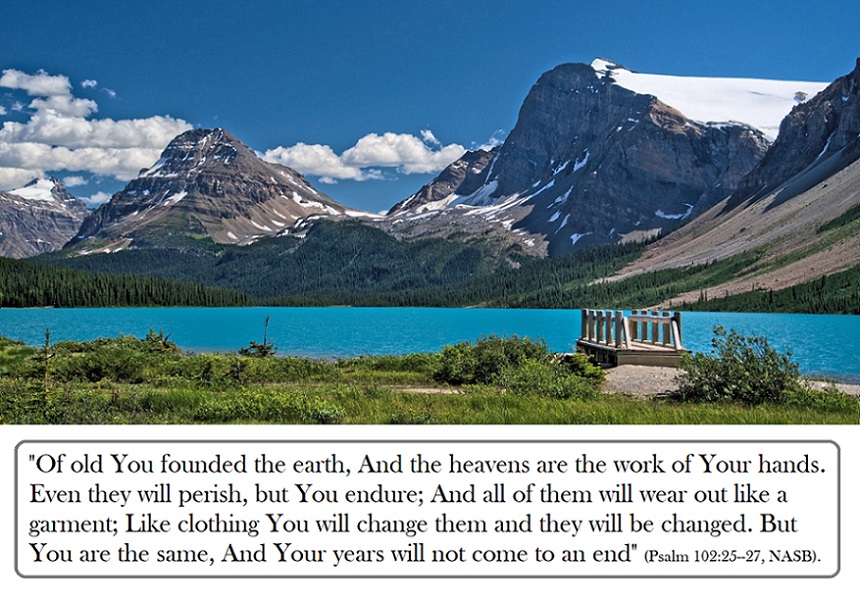“Go therefore and make disciples of all the nations…teaching them to observe all that I commanded you; and lo, I am with you always, even to the end of the age” (Matthew 28:19-20, NASB).
——————–
Contents:
1) Our God Does Not Change (Jon Quinn)
2) The Prepared Heart (Gary Henry)
3) Temptations & Illusions (Bill Crews)
4) News & Notes
——————–

-1-
Our God Does Not Change
Jon Quinn
“To every thing there is a season, and a time to every purpose under heaven” (Eccl. 3:1). We live in a world of constant change. Time changes everything we see and touch. Things that were “in” yesterday are “out” today. I remember when I was a boy seeing all my father’s old ties hanging in the closet. They were wide and colorful, full of intricate designs. He never wore them so I asked why. He said no one wears ties like that any more but he expected that if he waited long enough that they would come back in style. I doubted that anyone would ever wear anything like those ties again, at least not unless forced to do so at gun point! But sure enough, by the time I was in high school I was able to borrow his old, outlandish ties and let everyone assume that I had paid big bucks for them at the store.
The state of the world is different than it was ten years ago; far different than forty years ago. What will it be like ten years from now? As we read the Bible we see that it has always been so. We see changes in society; apostasy and return; dynasties thought eternal crumble and new ones take their places. Individuals age and grow closer to God, or sometimes grow away from God. We are accustomed to seeing things change.
It seems as if everything changes but such is not the case! Our link to Abraham, Moses and Paul is that we serve exactly the same God as they did. We may live in a different time, under a different government, but we build our relationship with the very same God, and for that reason the lessons they learned will find application in our lives today. God does not change. Let us consider this idea.
God’s Existence Does Not Change
“Of old Thou didst found the earth; And the heavens are the work of thy hands. Even they all perish, but Thou dost endure, And all of them will wear out like a garment. . . but Thou art the same, and Thy years will not come to an end” (Psa. 102:25-27).
God had no beginning nor does he have an ending. Children sometimes ask the question, “Who made God?” The answer is that God did not need to be made because there was never a time in which he did not already exist. He will never cease to be, nor will he ever cease to be what he already is. He is deserving of our trust because “The eternal God is thy refuge, and underneath are the everlasting arms” (Deut. 33:27).
God’s Character Does Not Change
“And God said to Moses, ‘I AM WHO I AM’ and He said, ‘Thus you shall say to the children of Israel, ‘I AM has sent me to you'” (Exod. 3:14).
In the course of human life, events may alter the character of a man. There are things that happen to us that can change us forever. For example, a trusting soul may become cynical when he has been betrayed. But nothing like this happens to the Creator. He will never become less fair, honest, truthful, or good than perfection will allow. The character of God today is exactly as it was in Bible times, and as it will be long after this world ceases to be. Even the name “Jehovah ” or “I AM” bears out the eternal changelessness of God. The New Testament describes God as “the Father of lights, with Whom there is no variation, or shifting shadow” (Jas. 1:17).
God’s Purpose Does Not Change
“And the Glory of Israel will not lie or change His mind; for He is not a man that He should change His mind” (1 Sam. 15:29). God does not alter his purpose. He does not go half-way into a job, then realize that he has made a mistake and repent. All his plans are based upon perfect wisdom and knowledge so he never has to! Nothing can take God by surprise. If he were painting a room he would not paint himself into a corner.
The Psalmist declared, “The counsel of the Lord stands forever, the thoughts of His heart to all generations” (Psa. 33:11). Some may wonder about a few passages which seem to indicate that God does repent (Gen. 6:6; 1 Sam. 15:11; Jon. 3:10; etc.). However, it must be understood that none of these suggest a change in his eternal purpose, nor do they suggest that God was taken by surprise. They are cases of God’s reversal of his prior treatment of an individual or group because the people had changed. If a people grew increasingly wicked, then God’s treatment of them changed from what it was before. If a people repented and sought forgiveness, then God would bless instead of punish.
God’s Son Does Not Change
“Jesus Christ is the same yesterday, today, yes and forever” (Heb. 13:8). Jesus loves us as much today as he did on the road to Calvary. There is a story of someone asking him, “How much do you love me?” Jesus answered, “This much” and he stretched his arms out wide, and died. Certainly the gift Jesus has given us shows us that his love is eternal. His death proves that his love is undying. Jesus is “the Living One; and I was dead, and behold, I am alive forevermore” (Rev. 1:18). Jesus is “able to save forever those who draw near to God through Him, since He always lives to make intercession for them” (Heb. 7:25). He is our absolutely trustworthy friend. What a friend we have in Jesus!
Conclusion
What is the difference between our relationship with God and those in Bible times? We worship the same God, not a new one. His character remains the same, we can know what he is like now by observing what he was like then. His purposes remain unchanged. The Messiah we accept is the same Son of God who they looked for, welcomed, and accepted.
We may live in a different age. We may rejoice that we live under a new covenant. We may have a complete written revelation and therefore a more accurate picture of God’s eternal purpose, character and nature. But God remains the same. By all means, place your eternal spirit in his hands.
— Via Navarre Messenger, January 6, 2019
——————–

-2-
The Prepared Heart
Gary Henry
“For Ezra had prepared his heart to seek the Law of the LORD, and to do it, and to teach statutes and ordinances in Israel” (Ezra 7:10).
Our “nature” is given to us by God, but our “character” is created by our choices. What we do with the raw materials of our created nature brings into being a character that is either good or bad. Of course, the fact that character is a matter of choice does not mean the choices are always carefully made. Indeed, many people simply live by default, going with the flow and ending up with a character that has been chosen haphazardly. But haphazard choices are still choices. Whether we’ve been careful or not, we’ll still have to account to God for our decisions.
Ezra is said to have “prepared his heart.” Apparently he had given some thought to the sort of man he wanted to be. Surely he was aware of what the major alternatives are that lie before a human being, and his choice to pursue godliness seems to have been a deliberate decision. It’s not unlikely that Ezra had given some consideration to the matter of consequences. There is no more “consequential” choice than the choice of one’s character, and Ezra had no doubt considered that some kinds of character would take him places he didn’t want to go.
It is worth noting the particular character Ezra prepared himself to have. This wise man determined that he would (1) seek God’s will, (2) do whatever he learned, and (3) teach to others the things that he had both learned and lived. We could look a long time and not find a better three-point program for character development. Seeking, doing, and teaching… the will of God. These things point to the very heart of what human existence is all about.
If we’ve not already done so, it’s urgent that we prepare our hearts. It’s time to think seriously about what matters most to us. What kind of people do we intend to be, anyway? “When a man does not know what harbor he is making for, no wind is the right wind” (Seneca). But preparing our hearts requires more than charting our course. We must also count the cost and resolve that we’ll pay the price to have a character that’s worth having. The devil is eager to test how well prepared our hearts really are.
“You cannot dream yourself into a character; you must hammer and forge yourself one” (James Anthony Froude).
— Via Kirkwood church of Christ, July 18, 2017
——————–

-3-
Temptations & Illusions
Bill Crews
Read the third chapter of Genesis. It tells of the sins of Adam and Eve (in doing what God had expressly forbidden) and of the consequences of those sins. When confronted by God and asked, “What is this thou hast done,” she responded, “The serpent beguiled me, and I did eat” (vs. 13). She told the truth. Paul wrote that “the serpent beguiled Eve in his craftiness” (2 Cor. 11:3; cf. 1 Tim. 2:14). But she was neither justified nor excused. Do you think that the pleasures of her sin were worth the price of the consequences she had to pay for them? How many times thereafter she must have wished that she could relive that moment when she said “yes” to that temptation.
Sin, in prospect, promises so much, but delivers so little. Sin, in retrospect, is never as appealing as sin in prospect. It focuses on the pleasures of the moment and veils the eyes to the consequences that time and eternity will surely bring. The writer of Hebrews spoke of the deceitfulness of sin (Heb. 3:11-13), and nothing in life is more deceitful than sin. The master of deceit is behind it all (Jn. 8:44), and he is called “the deceiver of the whole world” (Rev. 12:9). He has even fashioned “himself into an angel of light;” he has many ministers, some of whom even fashion “themselves into apostles of Christ” (2 Cor. 11:13-15).
In a large shopping mall there was a wide area containing several businesses in small, individual booths. Side by side were two with these names: “Sweet Temptations” and “Grand Illusions.” (One sold sweet things to eat, and the other jewelry.) I thought: “What marvelous names for the devil’s enticing wares and deceptive promises.” He portrays his temptations as sweet, but how bitter they will always eventually prove to be. And his promises of benefits, gains, and rewards are only grand illusions.
— Via Roanridge Reader, Volume 25, Issue 24, Page 1, June 13, 2010
——————–
-4-
News & Notes
Folks to be praying for:
Olivia McCarthy has been quarantined at home with covid-19. Though she has been experiencing the symptoms for about a week, they continue to remain mild. Let us be keeping her and her family in prayer.
We are thankful and glad that Myrna Jordan is now doing better from her recent illness.
Others to also be praying for: the family and friends of James William “Billy” Savage who passed away October 20, Elaine Abbott, Rick Cuthbertson, Joyce Rittenhouse’s brother, Joanne Ray, Rex & Frankie Hadley, Anita Young, Ronnie & Melotine Davis, Vivian Foster, Doyle Rittenhouse, James Medlock, Larry & Janice Hood, Judy Daugherty, Deborah Medlock, Jamie Cates, A.J. & Pat Joyner, Jim Lively, Harris Lefort, Allen & Darlene Tanner, Shirley Davis, Pat Brigman, Tim Kirkland, and Cameron Haney.
——————–
The Steps That Lead to Eternal Salvation
1) Hear the gospel — for that is how faith comes (Rom. 10:17; John 20:30-31).
2) Believe in the deity of Jesus Christ (John 8:24; John 3:18).
3) Repent of sins. For every accountable person has sinned (Romans 3:23; Romans 3:10), which causes one to be spiritually dead (Ephesians 2:1) and separated from God (Isaiah 59:1-2; Romans 6:23). Therefore, repentance of sin is necessary (Luke 13:5; Acts 17:30). For whether the sin seems great or small, there will still be the same penalty for either (Matt. 12:36-37; 2 Cor. 5:10) — and even for a lie (Rev. 21:8).
4) Confess faith in Christ (Rom. 10:9-10; Acts 8:36-38).
5) Be baptized in water for the remission of sins (Mark 16:16; Acts 2:38; 22:16; Rom. 6:3-4; Gal. 3:26-27; Col. 2:12; 1 Pet. 3:21). This is the final step that puts one into Christ (Gal. 3:27). And from that baptism, one is then raised as a new creature (2 Cor. 5:17), having all sins forgiven and beginning a new life as a Christian. For the one being baptized does so “through faith in the working of God” (Col. 2:12). In other words, believing that God will keep His word and forgive after one submits to these necessary steps. And now as a Christian, we then need to …
6) Continue in the faith by living for the Lord; for, if not, salvation can be lost (Matt. 24:13; Heb. 10:36-39; Rev. 2:10; 2 Pet. 2:20-22).
——————–
Tebeau Street
CHURCH OF CHRIST
1402 Tebeau Street, Waycross, GA 31501
We are currently meeting for only our Sunday 10 a.m. worship service each week, due to the coronavirus situation.
evangelist/editor: Tom Edwards (912) 281-9917
Tom@ThomasTEdwards.com
https://thomastedwards.com/go (older version of the Gospel Observer website, but with bulletins going back to March 4, 1990)